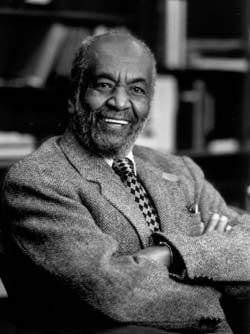Black Voices in Education: Dr. Edmund Gordon
Posted on
 Dr. Edmund Gordon is a professor of psychology whose career work has heavily influenced contemporary thinking in psychology, education, and social policy. Dr. Gordon’s research and initiatives have focused on the positive development of under-served children of color, including advancing the concept of the “achievement gap.”
Dr. Edmund Gordon is a professor of psychology whose career work has heavily influenced contemporary thinking in psychology, education, and social policy. Dr. Gordon’s research and initiatives have focused on the positive development of under-served children of color, including advancing the concept of the “achievement gap.”
Dr. Gordon grew up in a highly segregated area of North Carolina to parents who encouraged the importance of schooling. He received both his Bachelor’s and Master’s degrees from Howard University, and went on to pursue a PhD in psychology at the Teacher’s College at Columbia University.
In 1956, after working with mentor and friend W.E.B. DuBois, Dr. Gordon was commissioned by President Lyndon B. Johnson to help design the Head Start Program, aimed at providing early childhood education and family services to under-resourced families. After six months working on Head Start, Dr. Gordon and his team had built a program to serve nearly half a million children. Dr. Gordon also conducted research that would later be used to prove to the Supreme Court that school segregation had harmful effects on children. Dr. Gordon strongly advocated the importance of understanding the learner’s frame of reference in the development of education action plans.
Dr. Gordon has authored 18 books and more than 200 articles on the achievement gap, affirmative development of academic ability, and supplementary education. He has been elected a Fellow of many prestigious organizations, including the American Academy of Arts & Science, and has been named one of America’s most prolific and thoughtful scholars.
At 99 years old, Dr. Gordon still pays close attention to the state of education, and has stated that he would love to be able to change national education policy “to get a more equal focus on out-of-school and in-school learning.” Learn more about Dr. Gordon here.
Plus, check out our Black Voices in Education card series to learn about more Black individuals who influenced education and educational equity!
Back to Blog